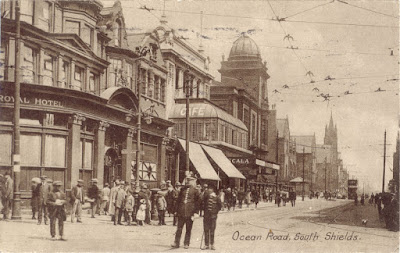 |
| The Customs House at Mill Dam, South Shields |
I’m up in Newcastle. The idea was to do some research and remove myself from the distractions of London life. So far so good…
I’ve been staying in the Turnbull Building, an imposing converted Victorian warehouse, oddly reminiscent of Disney’s Tower of Terror, perched above the Quayside. Scenes from Get Carter were filmed here! How cool. Thank you, Airbnb.
In between reading through more of my great-grandfather’s stories about Geordie and his time aboard ship learning the ropes (literally), transcribing his letters to his wife and brother from 1918, and becoming a modern day expert in sea shanties - and of course finding some distractions here (Newcastle’s 3-0 stunner at St. James Park!)…I spent yesterday in South Shields delving into the local history.
I started my day at the famous Mill Dam where my great-grandfather would go regularly to see whether ships were taking on sailors. He talks about this place frequently in his journals, and in all my years visiting Shields I don't think I had ever made it here. I met local legend Janis Blower at the Customs House. Janis worked at the Shields Gazette for 44 years and has a deep knowledge of and connection to local seafaring history. I picked up a copy of her book at the Customs House, which has been an informative read.
 |
| View of the Tyne along the waterfront at South Shields |
After leaving the Customs House I took a wind-swept stroll along the river front to the location of the original town. Today all that’s left of this once bustling site is a series of small warehouses, workshops and a museum wedged tightly up against the waterfront. On the other side of Wapping Street, the main thoroughfare, is a steep hill. Later at the Library as I was reading about the old town’s appalling housing conditions - conditions that saw outbreaks of cholera and smallpox in the mid to late-1800s - I wondered how so many people and houses had fit in such a narrow space.
After this I walked back up to Kings Street. I stopped in at the Museum to see an installation on Shield in the post-WWI period and headed on to the Central Library. Here I picked up a copy of George B. Hodgson’s The Borough of South Shields. Hodgson confirmed what I had always known - that “Shields folk [are] a race apart” with their own distinctive customs and speech. Indeed, as a child I remember my granddad explaining to me the differences between the “divvents” and the “dean’ts” and the differences in dialect between north and south Tyneside.
The period in which my great-grandfather sailed from Shields coincided with a period of great prosperity and growth, fuelled by demand for coal and other commodities:
- During the census period 1881-1891, shortly after my great-grandfather was born, the population grew by 38% - second only to Cardiff. In the period 1891-1901 it grew by 24%.
- By the end of the 19th century almost half a million tons of shipping was clearing through Shields, compared with 87,000-tons 30 years earlier.
- Coal shipments from the Tyne between 1885 and 1914 rose from 9.84m to 20.3m tons
This period was marked by the establishment of the Customs House, Mercantile Marine Office, Tyne River Police office and other major town developments. However the period ends with great losses of lives in both Great Wars, what are thought to be the first ‘race riots’ in Britain between Arab and white seamen competing for jobs, and general economic decline. According to Janis in the 1950s ship building and repair remained strong in the Tyne; however by the 1970s most of this had been lost to foreign competition.
At the library I was also shown census records and national archive listings for my great-grandfather and a map of the area in which he lived from the 1850s. Princes Street in the Leygate area of town no longer exists as the area under went major redevelopment in the ‘60s - but Alice Street remains.
Today, the centre of gravity of the town has shifted to the seafront at Little Haven. As I walked along the promenade, I was reminded of something my great-grandad wrote in one of his books:
- “My boy, wonderful happenings are recorded in books. That’s so. But, I think more wonderful are the happenings that are not recorded in them; things known, very often to no-account folk. Sailors, firemen and rovers in general.”
My great-grandfather’s insights are but a small drop in the ocean of memory and experience. Exploring and highlighting these are my small contribution to giving these no-account folk a voice - and to the town which has played such a large role in my life.

